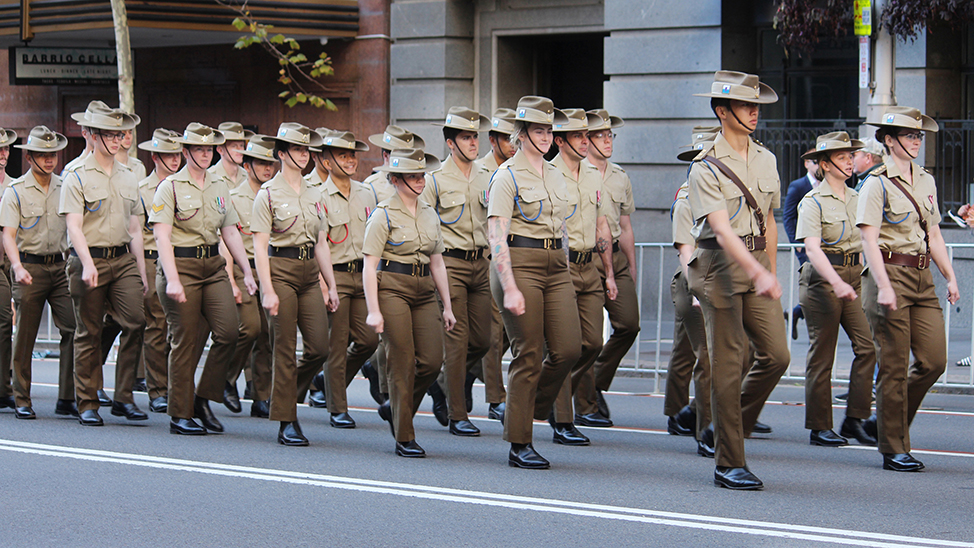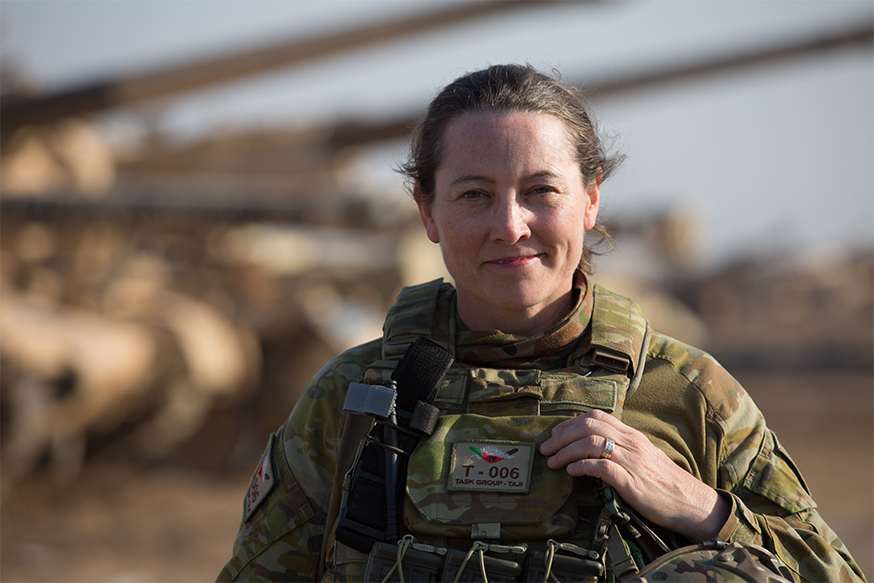08 April 2024
UniSA alum Dr Sharon Mascall-Dare OAM is an Adjunct Associate Professor at UniSA and a Lieutenant Colonel in the Australian Army Reserve. As 25 April approaches, she asks how we might consider Anzac Day in a more contemporary context.

Dr Sharon Mascall-Dare OAM
Adjunct Associate Professor – Justice and Society
Lieutenant Colonel Australian Army Reserve
This Anzac Day, Australia will again reflect on the reasons for commemoration. Historians will examine the significance of the day; there will be criticism of its exploitation for commercial gain. Some will ask whether they should capitalise “ANZAC” or use the word “Anzac”. Meaning no harm, some will use the word “celebrate”, and be told they should “commemorate”. Others will disregard the day entirely, preferring to spend the day alone or with friends who feel no connection to the day.
Since the Anzac Centenary, the complexity and ambiguity of the Anzac narrative has only deepened, defying attempts to capture individual and collective memory within one, single narrative. Despite more than a century of revisits and revisions, the story and its current significance remain elusive, defying a single interpretation with each passing year.
There is, however, an alternative perspective. Rather than view the Anzac narrative as a debate to be had, or a story to be told, it can be viewed as an opportunity: an annual reminder to reflect on the diversity of Australian culture and identity in an increasingly complex and contested informational age.
The origins of the Anzac narrative lie in media representations of the conduct displayed by the Australian and New Zealand Army Corps (ANZAC) during the Gallipoli campaign of 1915. The British journalist, Ellis Ashmead-Bartlett, composed its founding narrative from the relative safety of a battleship, the HMS London, when the landings took place on 25 April 1915. The more immersive and enduring record by Australia’s official war correspondent and historian, Charles Bean, was to follow, chronicling the war as an embedded journalist in the trenches from Gallipoli to the Western Front. But while Bean’s accounts of the Great War were comprehensive, they were not inclusive, as we understand that word today.
In recent years, the historical record has been revisited to embrace the absent. We are increasingly aware of the contributions of Indigenous Australians; we have also embraced the stories of nationalities who served alongside Australia and New Zealand – soldiers from India, France and Algeria, to name just a few. We have acknowledged the significant contributions of Australian medical women, who risked their lives to use their skills, and we remember the families at home, discovering narratives that have been previously disregarded.
The “grand narrative” no longer has a place in current collective memory. Instead, as we approach Anzac Day, we have an opportunity to explore the complexity and uncertainty of war’s retelling in both the past and the present. Anzac Day serves as a platform for reflection, revision and remembrance, inviting us to confront realities that defy a single headline or perspective.
Central to such exploration are complexity, diversity, and a commitment to inclusion. As a multicultural and diverse society, Australia has a unique opportunity to celebrate the different backgrounds and experiences of those who have been impacted by the reality and legacy of war throughout Australia’s history. By acknowledging and embracing all perspectives, we engage with Anzac Day critically and consciously, ensuring that all voices are respected and heard.
Anzac Day can be an opportunity for self-reflection, compassion, and reconciliation, allowing us to confront uncomfortable truths and acknowledge past injustices. It can be a day to recognise the service and resilience of Indigenous servicemen who fought for a country that did not recognise them; it can be a day to pay tribute to the migrants who served their adopted homeland with loyalty and courage. It can be a day to recognise that some Australians feel pride and patriotism while others feel no connection to Anzac Day at all. It can be a day to acknowledge that some veterans feel strongly connected to their service while others find Anzac’s mythology unhelpful and painful.
Inclusion necessarily requires compassion; diversity necessarily requires respect for others’ views. Anzac Day is not a day to impose a single narrative or interpretation of events. It is a day to recognise that if we are to agree, we agree on our freedom to choose how we think and feel. Anzac Day is both personal and public; it is both individual and national. But how we respond must remain our personal choice.

Born in the United Kingdom, Sharon Mascall-Dare studied French, German and later broadcast journalism. In 1999, she, her husband Paul and their infant son emigrated to Australia, where they had a second child. Sharon worked as a freelance journalist and documentary maker and undertook a PhD at UniSA looking at Australians’ relationship with Anzac Day.
During her studies, Sharon met many defence force personnel and found their values resonated with her. With the media industry in flux at the time, Sharon successfully applied for a role in military public affairs. As a woman in her early 40s with two teenage children, Sharon completed specialist service officer training and was deployed to Iraq for six months.
Now a Lieutenant Colonel, Sharon balances her roles as a serving reservist officer based in Canberra and Adjunct Associate Professor at UniSA, and is involved in assisting defence force personnel in transitioning into civilian life, research collaboration, and mentoring.




